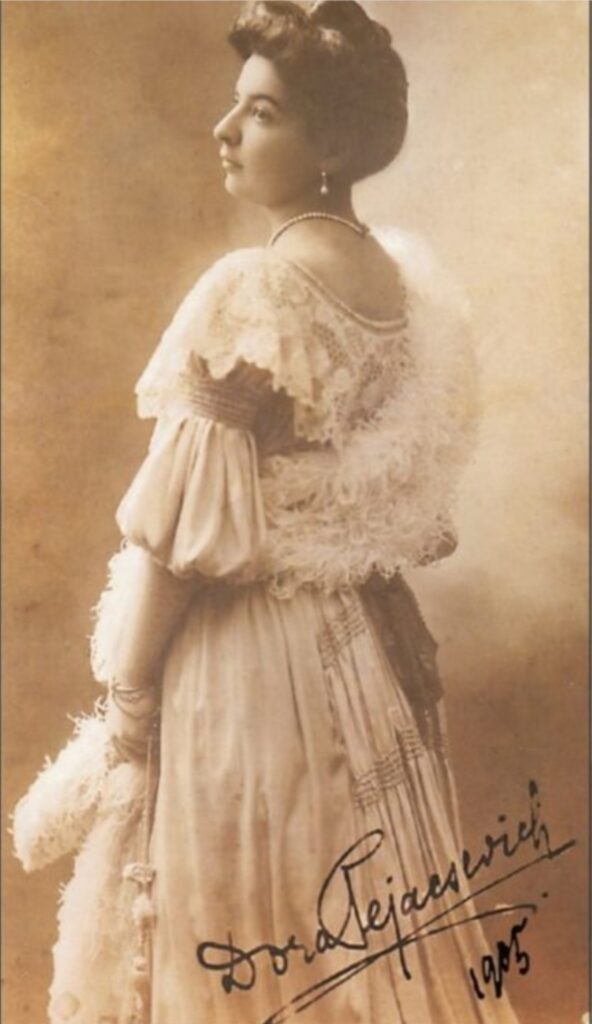
Dora Pejačević, credit Wikipedia
Endnotes, December 2022
In this edition: a piano concerto and a symphony by Dora Pejacevic; Rachmaninov from the Sinfonia of London; spiritual intensity from American composer, Randall Svane, reviewed by Stuart Millson
A commitment to new and overlooked music has always been at the heart of the BBC Symphony Orchestra’s artistic outlook. During the 1970s and ‘80s, the ensemble tended to perform works strongly connected with either the Second Viennese School, Stravinsky and Bartok, or the avant-garde experimentation of Boulez. Today, the repertoire has softened somewhat: contemporary composers have retuned themselves (at least, in part) to the recognisable outlines of tonality, and programmers have mined a rich reserve of late-romantic/early 20th century figures, such as the Richard Strauss-influenced Croatian, Dora Pejacevic (1885-1923).
Under the baton of Chief Conductor, Sakari Oramo, the BBC SO appears on the Chandos label in glorious depth, in Pejacevic’s Piano Concerto, written just before World War One in which Pejacevic served as a volunteer nurse and premiered in Zagreb in 1916. Despite emerging in the gloom of the European maelstrom, this Great War concerto has significant optimism in many of its great statements; a flourish in its style, and a lyricism that showed how not all art had become doom-laden. Peter Donohoe, renowned for his intense Rachmaninov cycles, is the soloist in this performance, bringing all of his knowledge and authority to bear on an unknown concerto that demands a spirited interpretation, to place it alongside the classic concertos so often heard in the concert halls of Europe.
Andante speaks of an artistic soul who has maintained her integrity through distressing times: a point reiterated by biographer, Koraljka Kos (quoted in the informative and well-edited CD booklet) who observed how Pejacevic composed in a wave of self-generated vigour and determination, as a means of rising above the sorrow and bloodshed of 1914-18.
The Chandos catalogue, once again, provides the classical CD-buying public with yet another heavyweight recording masterpiece, a Rachmaninov orchestral collection whose main piece is the rarely-heard Third Symphony, a work of the composer’s exile years of the 1930s, with its Allegro vivace finale and sighs of homesickness. The United States provided Rachmaninov with his safe haven from a Russia torn to pieces and oppressed by Communist commissars, but for the composer, the true soul, poetry and intense religious belief of Russia lived on in his music.
But it is a 1909 composition that really stands out (at least, for this reviewer) – The Isle of the Dead, a 20-minute symphonic realisation of an unsettling painting by Arnold Bocklin, which depicts the ferryman of ancient myth rowing a supernatural figure to a mysterious island; thought, in fact, to be based upon a real landscape and seascape near Corfu. The ripples of dark water, the sense of being propelled to the after-life, all appealed to the brooding Russian romantic composer.
Here, on the newly-minted Chandos CD, the slow (but inexorable) course toward the dead island is plotted by the Sinfonia of London, conductor John Wilson’s handpicked recording and gala-concert super-orchestra. What appears to be (from the expansive sound of the instruments) a very large or well-spaced-out body of strings, sets a spine-tingling stage for this unnerving journey. Hypnotic and quietly relentless, Rachmaninov’s unearthly long introduction is given an authenticity of sound, probably not heard since the days of the old Philadelphia Orchestra under Stokowski and Ormandy, the very artists with which the composer collaborated in his last years.
Finally, to The Quarterly Review’s latest discovery: the contemporary United States composer, Randall Svane. A CD label is yet to champion this astonishing new voice in American music, so we have to rely upon digital files and YouTube. But the music does not disappoint: an understated Violin Concerto, like a newly-unearthed score by Sibelius, dwelling and mulling over numerous meditative ideas (giving the soloist some intricate cadenza work) and breaking into a Prokofiev-like mini-march; and a seven-movement symphony (as ritualistic and full of elation as Hindemith’s Nobilissima Visione, or Mathis der Maler) which brings the life of St. Francis before us in a blaze of belief.
Yet Randall Svane also writes on a more intimate scale, as can be seen in his equally heavenly Emily Dickinson setting for chamber ensemble and voices, Because I could not stop for Death; music that seems more in the sound-world of Vaughan Williams and Britten, than that of Philip Glass and John Adams. Recently premiered by the Theodor Schutz Ensemble and Quartet Berlin-Tokyo, conducted by Philipp Amelung, the piece deserves a mainstream recording.
CD details: Pejacevic, Symphony Op. 41; Piano Concerto Op. 33. BBC SO/Sakari Oramo, conductor, Peter Donohoe, piano. Chandos, CHSA 5299.
Rachmaninov, Symphony No. 3, Vocalise, The Isle of the Dead. Sinfonia of London, John Wilson, conductor. Chandos, CHSA 5297.
Stuart Millson is the Classical Music Editor of The Quarterly Review










